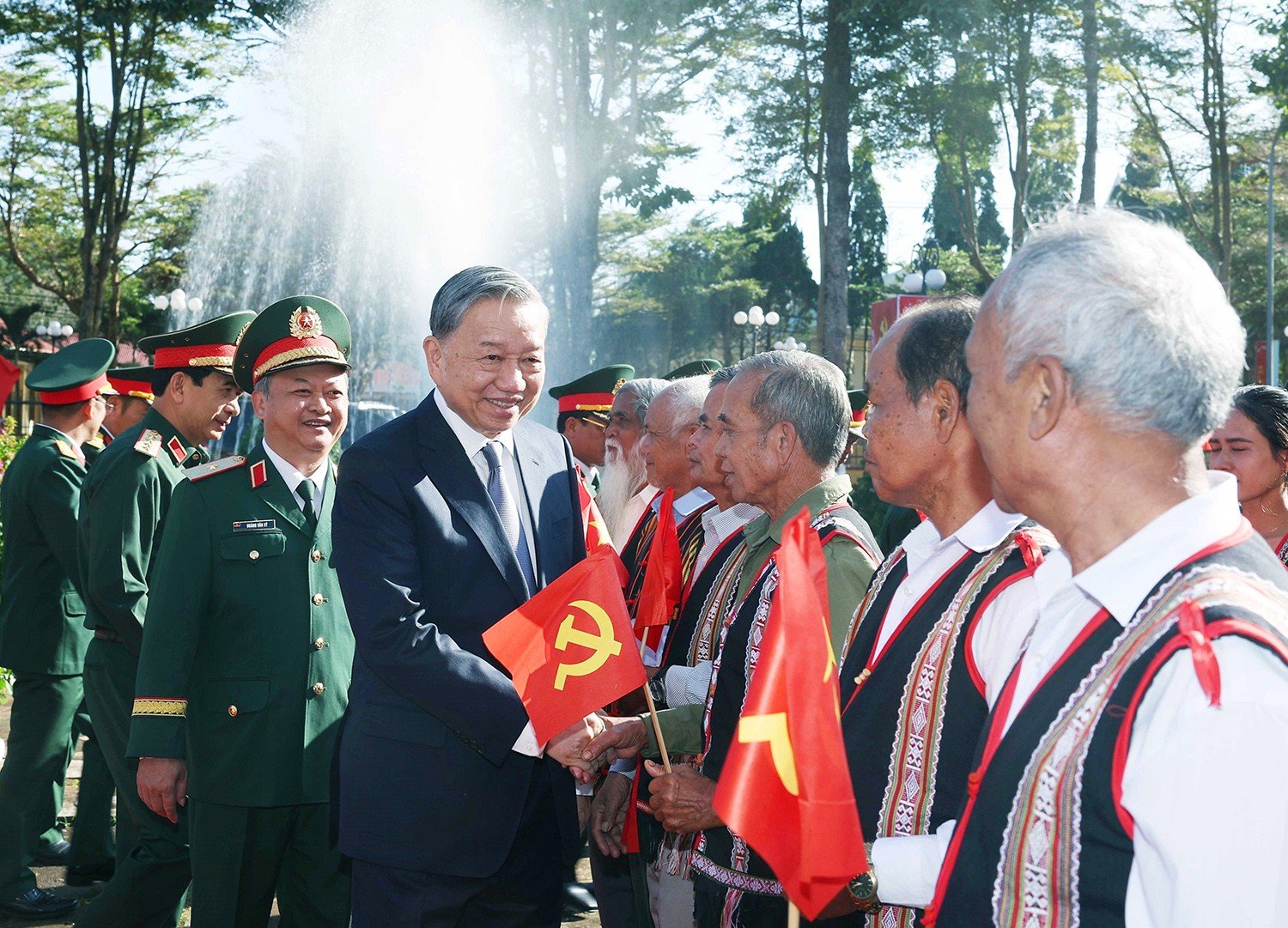 |
| General Secretary To Lam with village elders, village chiefs, and exemplary workers in Gia Lai province, January 6, 2025 (Photo: VNA) |
Ho Chi Minh's thoughts on solidarity, equality, and mutual progress among nations
National solidarity is a precious tradition of the Vietnamese people, forged from the history of thousands of years of building and defending the country. That tradition has become a source of strength, a weapon for the Vietnamese people to overcome many ups and downs and become increasingly strong. That tradition will forever be the red thread connecting and consolidating the great solidarity of the Vietnamese people, a source of great strength for our country to firmly step into a new era of development, an era of national growth.
In the article “We should learn our history” published in the Independent Vietnam newspaper, issue 117, on February 1, 1942, President Ho Chi Minh wrote: “Our history teaches us this lesson: When our people are united as one, our country is independent and free. On the contrary, when our people are not united, we are invaded by foreign countries” (1). Born into a family with a rich tradition of patriotism and understanding the value and strength of national solidarity, throughout his life of revolutionary activities, he always raised this awareness, making solidarity a political ideology and an effective leadership method.
In the light of Marxism-Leninism, the masses are the historical subject, the force that creates all revolutionary victories. Standing on the foundation of the nation's precious traditions, absorbing and creatively applying Marxism-Leninism to suit the characteristics of Vietnam, President Ho Chi Minh connected tradition and modernity, combined Eastern and Western cultural values, and promoted the principles of independence and equality in the relationship between nations in the world.
In the Declaration of Independence of the Democratic Republic of Vietnam, now the Socialist Republic of Vietnam, President Ho Chi Minh adopted the universal values of national rights and human rights from the 1776 Declaration of Independence of the United States and the 1791 Declaration of the Rights of Man and of the Citizen of France, that: “All men are created equal. They are endowed by their Creator with certain inalienable rights, among which are the right to life, the right to liberty, and the pursuit of happiness... In a broader sense, this sentence means: All peoples in the world are born equal; every people has the right to life, the right to happiness, and the right to freedom” (2).
In international relations, according to President Ho Chi Minh, equality between nations is an inevitable right and need; nations, no matter how small or weak, also desire and must always strive to achieve equality. Therefore, in the context of being invaded by French colonialism, he determined that the ultimate goal of the Vietnamese revolution was to liberate the nation, to gain independence and equality with other nations in the world. That is, the Vietnamese nation must be independent and free. For different nations in the world, equality is expressed in the position of national independence.
Equality of nations on a global scale has a close relationship and interaction with national independence; in which, national independence is the “root” condition of national equality. If the Vietnamese people want to have equality with other nations in the world, first of all, the nation must be independent and that independence must be real independence, complete independence. Therefore, to achieve equality of nations on a global scale, the Vietnamese people must strive to maintain freedom and independence.
To gain independence and move towards national equality on a global scale, it is necessary to unite all ethnic groups in the great family of Vietnamese ethnic groups. Referring to the reasons leading to the victory of the August Revolution in 1945, President Ho Chi Minh pointed out: “Especially because of the force of national unity. All ethnic groups, classes, localities, and religions rose up under the Viet Minh flag to fight for independence for the Fatherland” (3).
Since ancient times, Vietnam has formed many ethnic groups/nations. The process of living together has led to solidarity, connection, and working together to build and defend the country. When independence had not yet been achieved, they joined together to fight against foreign invaders; when independence was achieved, they lived together. In a letter to the Congress of Southern Ethnic Minorities, held in Pleiku on April 19, 1946, President Ho Chi Minh wrote: “Today, Vietnam is our common country... The country and the Government are our common country and Government. Therefore, all of our people must unite closely to preserve our country and support our Government. We must love each other, respect each other, and help each other to seek the common happiness of ourselves and our descendants. Rivers may dry up, mountains may erode, but our solidarity will never diminish. We are determined to join forces to maintain our freedom and independence” (4).
According to Ho Chi Minh's thought, solidarity among nations is not a political trick, but a sincere, honest, and close solidarity; solidarity is not imposed or forced, but must have true democracy; solidarity is not a tactic, but a strategy, a long-term solidarity.
In his speech at the 2nd Congress of the Vietnam Fatherland Front on April 25, 1961, he once again repeated the famous slogan:
“Unity, unity, great unity,
Success, success, great success”(5).
With this slogan, he emphasized the causal relationship: with solidarity, great solidarity, there will inevitably be success, great success. The Vietnamese revolution will succeed thanks to great solidarity.
The 1946 Constitution, the first Constitution of the Democratic Republic of Vietnam, now the Socialist Republic of Vietnam, was headed by President Ho Chi Minh and submitted to the National Assembly. Article 1 emphasized that all power in the country belongs to the entire Vietnamese people, regardless of race, gender, wealth, class, or religion. Article 8 affirmed that, in addition to equality in rights, ethnic minorities are assisted in all aspects to quickly catch up with the general level.
In the Report on the draft amended Constitution at the 11th session of the 1st National Assembly of the Democratic Republic of Vietnam, now the Socialist Republic of Vietnam, President Ho Chi Minh affirmed: "Our ethnic policy is to achieve equality and mutual assistance among ethnic groups to advance together towards socialism" (6).
National solidarity is not the mechanical gathering of mass groups and ethnic groups, but solidarity on the basis of equality. According to President Ho Chi Minh, national solidarity is the principle, the starting point and the goal to be achieved; national equality is the principle and the basis for achieving long-term, sustainable solidarity. According to him, there is an inseparable organic relationship between equality and solidarity and mutual assistance among ethnic groups. Equality and mutual respect are the basis for solidarity among ethnic groups; at the same time, to achieve true equality among ethnic groups, there is no other way than for ethnic groups to unite, bond, help and support each other. Once there is solidarity and equality, helping each other to develop and progress, especially in times of difficulty and adversity, is even more necessary. He also affirmed that solidarity, cooperation and mutual assistance are the ways to achieve equality among ethnic groups. In the Letter to the students of the Central Mountainous Pedagogical School on the occasion of the school's opening ceremony, he advised: "Today, if our ethnic groups want to progress and develop their culture, we must eliminate prejudices between ethnic groups, unite, love, and help each other like brothers in one family" (7).
When visiting and working with the people and officials of Cao Bang province on February 21, 1961, President Ho Chi Minh advised: "People of all ethnic groups, regardless of size, must love and help each other, must unite closely like brothers and sisters in one family, to build together a common Fatherland, build socialism to make all ethnic groups happy and prosperous" (8).
It can be affirmed that in many speeches and articles addressing issues related to ethnicity and ethnic work, President Ho Chi Minh paid attention to promoting the spirit of solidarity, equality and mutual assistance among ethnic groups. In which, solidarity is the root, solidarity is built on equal relations, and solidarity and equality must help each other develop and progress. That is true solidarity and equality.
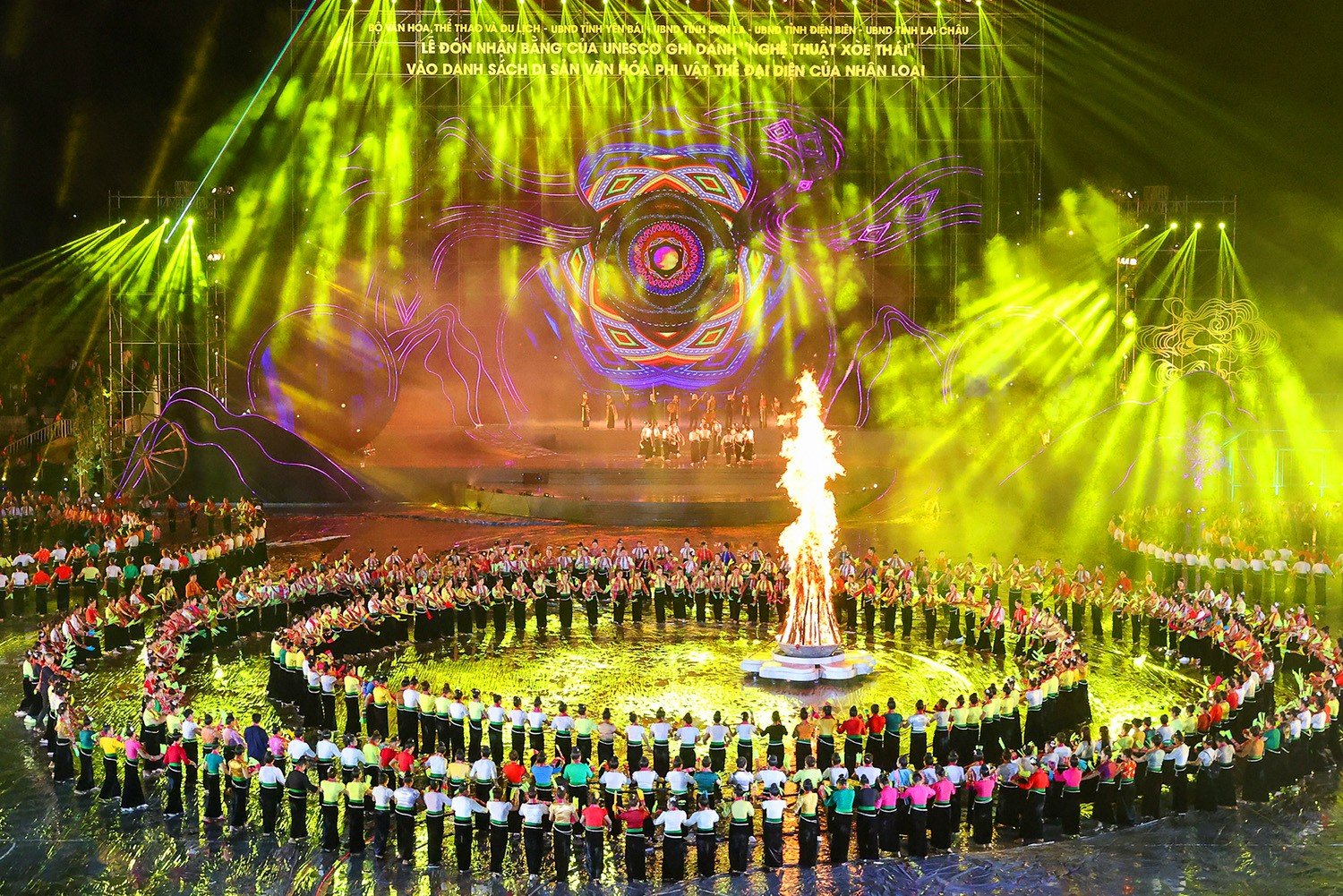 |
| Through cultural practice and performance, it contributes to strengthening solidarity among ethnic groups in the Vietnamese ethnic community (In photo: Art program with the theme "Thai Xoe - The quintessence of heritage land"). (Photo: Document) |
Promoting the values of Ho Chi Minh's ideology on solidarity, equality, and mutual assistance for progress among ethnic groups to build and consolidate the great national unity bloc in the current period.
Our country is a multi-ethnic nation; the great and historic achievements that the country has achieved, especially after nearly 40 years of implementing the renovation process, are thanks to the common achievements of the Vietnamese ethnic community. In the current period, Ho Chi Minh's thought on the issue of equality, solidarity and mutual assistance among ethnic groups continues to guide the formulation of our Party's ethnic policy and guide practical activities related to ethnic work and implementation of ethnic policies, aiming to properly resolve ethnic issues to achieve the common goal for the Vietnamese ethnic community, ensuring the construction and protection of the socialist Vietnamese Fatherland.
Inheriting and continuing the ideological values of President Ho Chi Minh, in the process of leading the Vietnamese revolution, our Party has always closely oriented; the Party's policies and guidelines clearly demonstrate the spirit of solidarity, equality, and mutual assistance for progress among ethnic groups.
At the 6th Party Congress (1986) - the Congress that paved the way for the cause of national renewal, our Party affirmed: "In economic and social development in areas with large ethnic minority populations, it is necessary to fully demonstrate ethnic policies, develop good and close relationships between ethnic groups in the spirit of solidarity, equality, mutual assistance, and collective mastery" (9).
The Platform for National Construction in the Transitional Period to Socialism adopted at the 7th Party Congress (1991) outlined the socialist society that our people are building, stating clearly: all ethnic groups in the country are equal, united and help each other to progress together.
Implementing the renovation policy, our Party issued Resolution No. 24-NQ/TW, dated March 12, 2003, of the 7th Central Conference, Session IX, "On ethnic work". In the spirit of the Resolution, some basic viewpoints on ethnic work for the entire political system are: 1- The ethnic issue and national solidarity are fundamental and long-term strategic issues; at the same time, they are also urgent issues of the Vietnamese revolution; 2- The ethnic groups in the great Vietnamese family are equal, united, mutually supportive, and help each other to develop together; 3- Comprehensive development of politics, economy, culture, society, national defense and security in ethnic minority and mountainous areas; 4- Prioritizing investment in socio-economic development in ethnic minority and mountainous areas.
In the Platform for National Construction in the Transitional Period to Socialism (Supplemented and Developed in 2011), our Party has determined that the socialist society that our people are building is a society in which the ethnic groups in the Vietnamese community are equal, united, respect each other and help each other to develop together.
At the 13th National Congress, the Party continued to affirm the principles of ethnic relations in Vietnam, which are “ensuring equality, solidarity, respect, and mutual assistance among ethnic groups for development” (10). In addition, the Party once again emphasized the value and strength of great national unity for the cause of national construction and development in the new context: “Promoting the will and strength of great national unity combined with the strength of the times; continuing to comprehensively and synchronously promote the renovation process; firmly building and defending the Fatherland, maintaining a peaceful and stable environment; striving to make our country a developed country with a socialist orientation by the middle of the 21st century” (11).
Currently, the implementation of the policy of solidarity, equality, and mutual assistance for progress among ethnic groups still faces some difficulties and limitations, specifically:
Firstly, the international context is undergoing many changes; relations between nations and peoples are both cooperative and combative; peoples all pursue their own national interests. Besides the positive aspects, complexity also increases when transnational nationalism affects many countries, not excluding extreme nationalism and narrow-minded nationalism affecting international relations. In particular, small countries are easily imposed and dominated by big countries.
In reality, hostile forces are still taking advantage of ethnic and religious issues to incite separatist, autonomous, and ethnic hatred in order to cause internal division in the country, creating pretexts for riots and overthrows in order to abolish the political regime of Vietnam; causing division and destabilization in some regions and areas with large ethnic minority populations, such as the Northwest, Central Highlands, and Southwest. This situation requires our country's ethnic policy to both unite ethnic groups under a common roof, maintain common development stability, and create a broad, even "specific" framework for ethnic groups to have the opportunity to access and enjoy the common fruits of development.
Second, in reality, it takes time and effective policies to gradually narrow the gap in living standards and incomes of ethnic minorities compared to the national average. Currently, a number of issues need attention to ensure living and production conditions for the community of residents who are still facing difficulties, such as improving risk response capacity, upgrading infrastructure, etc.
Third, it is necessary to overcome the mentality of dependence and expectation that still exists in some places and among some people. Mutual assistance among ethnic groups is mainly carried out through the Party and State's policies on ethnic work. To overcome limitations or local conditions, the Party and State have transferred qualified and experienced cadres to work in limited areas, and sent experts to areas with difficult socio-economic conditions to provide support. However, the important thing for sustainable development is the effort of each individual and community to promote endogenous strength to build a prosperous and happy life for themselves.
Fourth, the implementation of the Party's guidelines and policies, the State's policies and laws still has some shortcomings and has not achieved optimal efficiency. The leadership and management of ethnic affairs of the political system, in addition to basic achievements, still has some shortcomings. The team of cadres managing and implementing ethnic affairs is still small, unstable and inexperienced. The team of grassroots cadres, especially ethnic minority cadres in many places, is still weak, and the quality of cadres is not up to par with the requirements and tasks (12).
To promote the value of Ho Chi Minh's ideology on solidarity, equality, and mutual assistance for progress among ethnic groups in order to build and consolidate the great national unity bloc in the current period, it is necessary to effectively implement the following solutions:
Firstly, continue to thoroughly grasp the Party's viewpoints and guidelines, the State's policies and laws on great national unity; educate, propagate, and raise awareness of the tradition of solidarity, the spirit of equality and mutual assistance for development and progress in the community of Vietnamese ethnic groups for cadres and Party members at all levels; and enhance the spirit of self-reliance, self-reliance, and self-control of ethnic groups.
Second, continue to build and perfect mechanisms and policies on national solidarity and the development of ethnic minority areas in development policies and national target programs; promote economic development, improve the lives of ethnic minority people, and effectively resolve shortcomings and limitations in the relationship between ethnic groups.
Third, ensure national defense and security in border areas, remote areas, ethnic minority areas and mountainous areas, build a strong political system, especially the political system at the grassroots level. Strengthen ethnic minority cadres in ethnic minority areas, build a national defense and people's security posture, ensure security and political stability in ethnic minority areas in particular, and national security in general.
Fourth, culture is an effective “channel” to connect people, helping communities share and understand each other. Therefore, it is necessary to have a policy to respect cultural diversity, by preserving and conserving national culture; enhancing cultural connection and exchange by developing cultural tourism and community tourism models; through cultural practice and performance, strengthening solidarity among ethnic groups in the Vietnamese ethnic community.
Fifth, in addition to socio-economic policies, it is necessary to regularly and effectively support people in ethnic minority and mountainous areas, areas with difficult socio-economic conditions, especially in the context of unusual impacts of natural disasters and epidemics. This great responsibility belongs to the entire political system; in which, the Vietnam Fatherland Front plays an important role, being the focal point for gathering forces, gathering the strength of organizations and individuals towards sharing the difficulties of people of all ethnic groups. The Vietnam Fatherland Front needs to have regular programs and timely actions to help people, especially ethnic minorities, respond to risks and quickly stabilize their lives and livelihoods./.
---------------
(1) Ho Chi Minh: Complete Works, National Political Publishing House Truth, Hanoi, 2011, vol. 3, p. 256
(2), (3) Ho Chi Minh: Complete Works, op. cit., vol. 4, pp. 1, 18
(4) Ho Chi Minh: Complete Works, op. cit., vol. 4, pp. 249 - 250
(5) Ho Chi Minh: Complete Works, op. cit., vol. 13, p. 119
(6) Ho Chi Minh: Complete Works, op. cit., vol. 12, p. 372
(7) Ho Chi Minh: Complete Works, op. cit., vol. 9, p. 375
(8) Ho Chi Minh: Complete Works, op. cit., vol. 13, pp. 44 - 45
(9) Documents of the Party Congresses in the renovation period (Congresses VI, VII, VIII, IX), National Political Publishing House Truth, Hanoi, 2019, p. I, p. 95
(10), (11) Documents of the 13th National Congress of Delegates, National Political Publishing House Truth, Hanoi, 2021, vol. I, pp. 50, 14
(12) According to the Report on reviewing and evaluating the implementation of Conclusion No. 65-KL/TW, dated October 30, 2019, of the Politburo, "On continuing to implement Resolution No. 24-NQ/TW of the 9th Party Central Committee on ethnic work in the new situation" (2019 - 2023) of the Ethnic Committee, 2024.
Source: https://thoidai.com.vn/tu-tuong-ho-chi-minh-ve-doan-ket-binh-dang-giup-nhau-cung-tien-bo-giua-cac-dan-toc-gia-tri-cho-xay-dung-cung-co-khoi-dai-doan-ket-toan-dan-toc-trong-g-215659.html





![[Photo] General Secretary To Lam attends the 80th Anniversary of the Cultural Sector's Traditional Day](https://vstatic.vietnam.vn/vietnam/resource/IMAGE/2025/8/23/7a88e6b58502490aa153adf8f0eec2b2)
![[Photo] Prime Minister Pham Minh Chinh chairs the meeting of the Government Party Committee Standing Committee](https://vstatic.vietnam.vn/vietnam/resource/IMAGE/2025/8/23/8e94aa3d26424d1ab1528c3e4bbacc45)

















































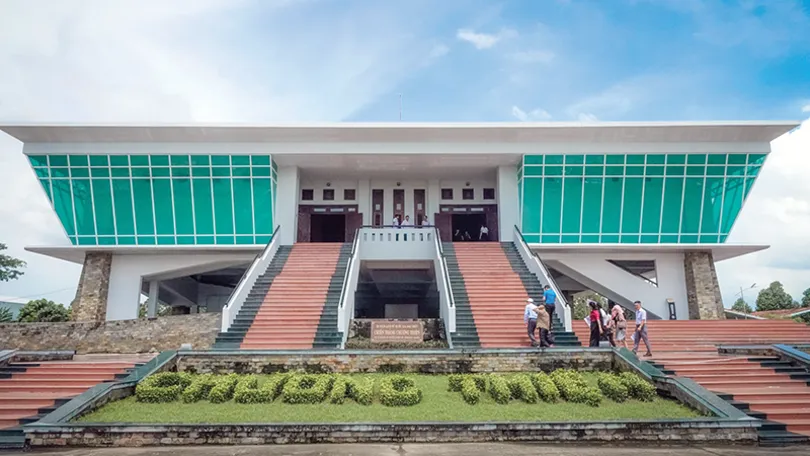

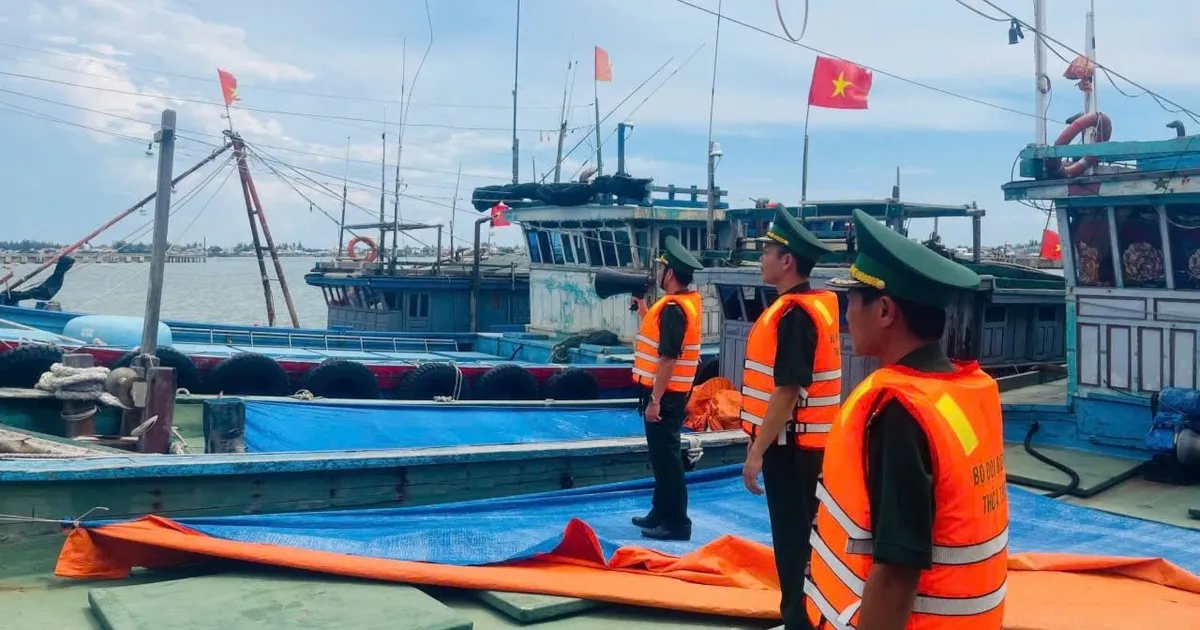

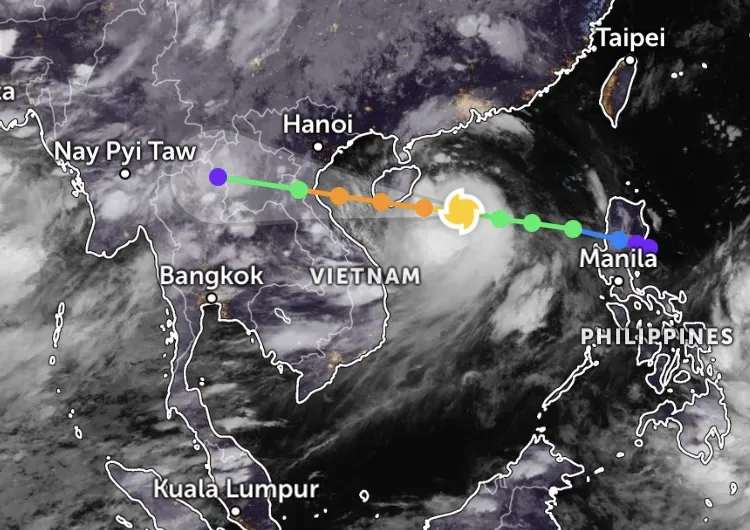
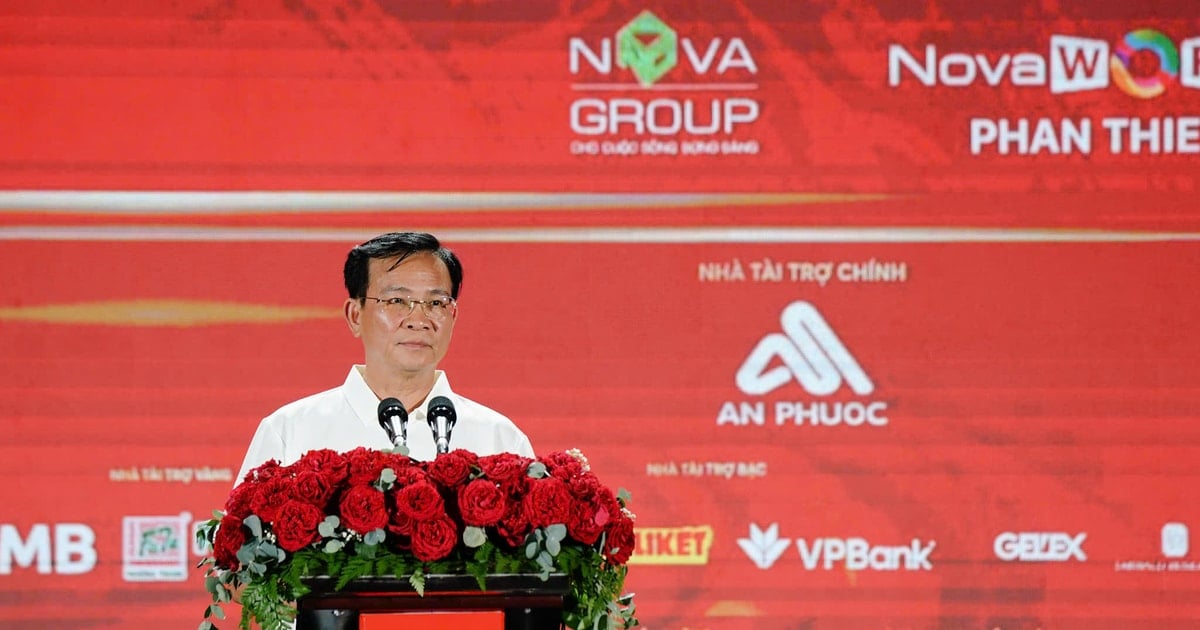

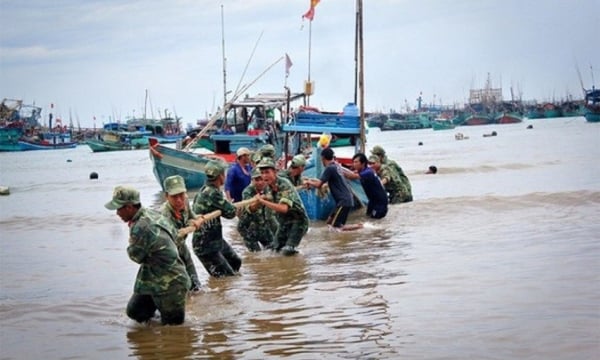

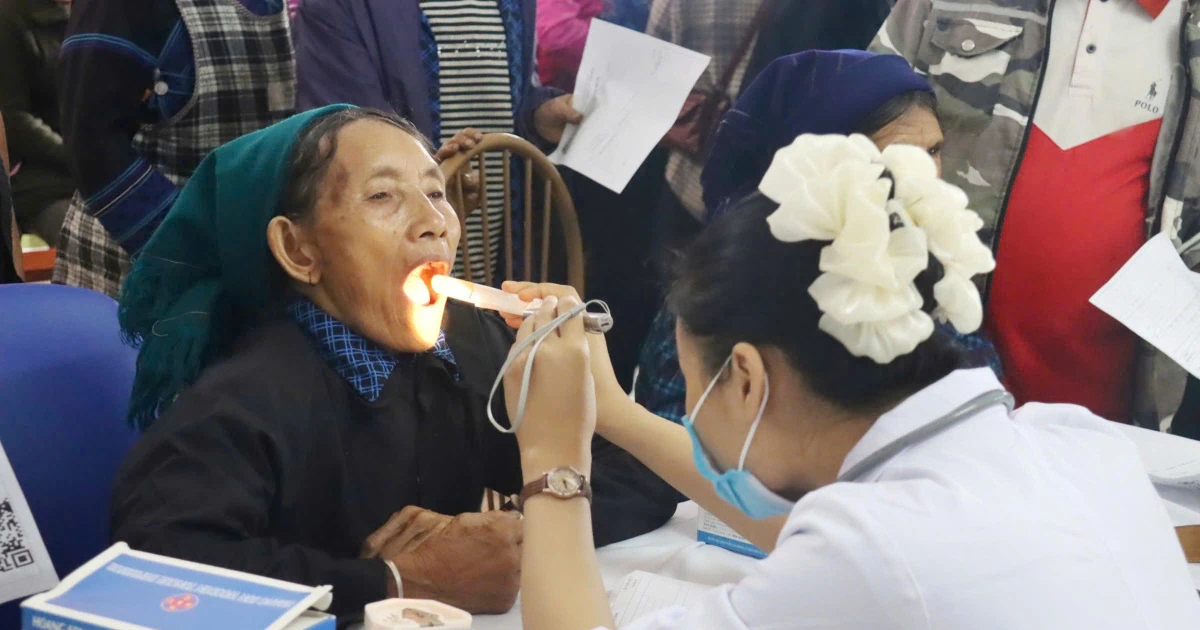















Comment (0)